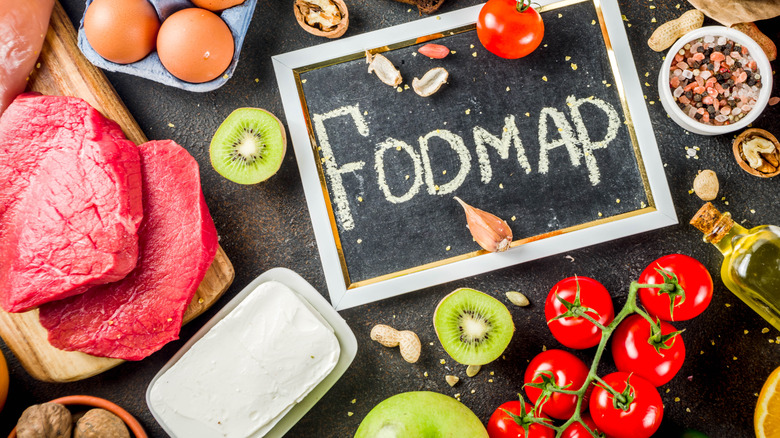Avoid Eating Watermelon If You Have This Medical Condition
Predominantly made up of H2O, watermelon serves as a deliciously hydrating fruit. That's not all it offers in the way of health benefits, though. According to 2022 research published in the scientific journal Nutrients, just 100 grams of watermelon supplies the body with 112 milligrams (mg) of potassium, over 8 mg of vitamin C, 10 mg of magnesium, and 0.4 grams of fiber. Researchers found that those who ate watermelon tended to have an overall healthier diet compared to people who did not regularly consume watermelon.
No question that watermelon is both tasty and nutritious, but for people with irritable bowel syndrome (IBS), it might be best to pass on that fruit bowl altogether. The American College of Gastroenterology reports that as many as 15% of American adults experience symptoms of IBS. Such symptoms may include stomach pain, diarrhea, bloating, gas, or constipation. The frequency and appearance of one's bowel movements may also be affected. But what's the connection between IBS and watermelon, specifically?
The natural sugar in watermelon may prompt IBS symptoms
Experts at NYU Langone Health explain that watermelon is high in natural sugar (fructose). Also referred to as "fruit sugar," fructose can potentially aggravate symptoms of IBS. While the cause of IBS isn't entirely clear, a 2015 research report published in Medical Hypotheses states that IBS has been seen in connection with fructose malabsorption. Because our capacity for fructose absorption differs from one person to the next, some individuals may be able to tolerate upwards of 30 grams of fructose while others may only be able to absorb up to 5 grams.
Joining watermelon in this high-fructose category are mangoes and apples. Similarly, high fructose corn syrup (an artificial sweetener) can often be found in candy, juice boxes, soda, condiments, and more. These food items may also bring about symptoms of IBS. For this reason, your doctor may suggest sticking to a low-FODMAP diet. Let's break down exactly what this diet consists of.
What is a low-FODMAP diet?
Fermentable oligosaccharides, disaccharides, monosaccharides, and polyols — or FODMAPs for short — are sugars that can induce gastrointestinal problems for those with IBS (via NYU Langone Health). Avoiding food items made up of FODMAPs may help reduce symptoms. Eventually, your doctor may suggest reintroducing some of these items into your diet one at a time to identify which exact foods may be the cause. In addition to watermelon, other FODMAP-containing foods include cow's milk, chickpeas, broccoli, asparagus, avocados, breads, cereals, and more.
In a 2019 scientific article published in Gastroenterology and Hepatology, the researchers examined study findings comparing the efficacy of different IBS diets. In one study comparing a low-FODMAP diet to the NICE guidelines diet, the low-FODMAP diet was found to more effectively relieve symptoms of bloating, gas, and stomach pain. While both diets may benefit IBS patients, 76% of individuals who adhered to the low-FODMAP diet reported being satisfied with control of their symptoms compared to 54% of patients in the NICE guidelines diet group who reported such satisfaction.



